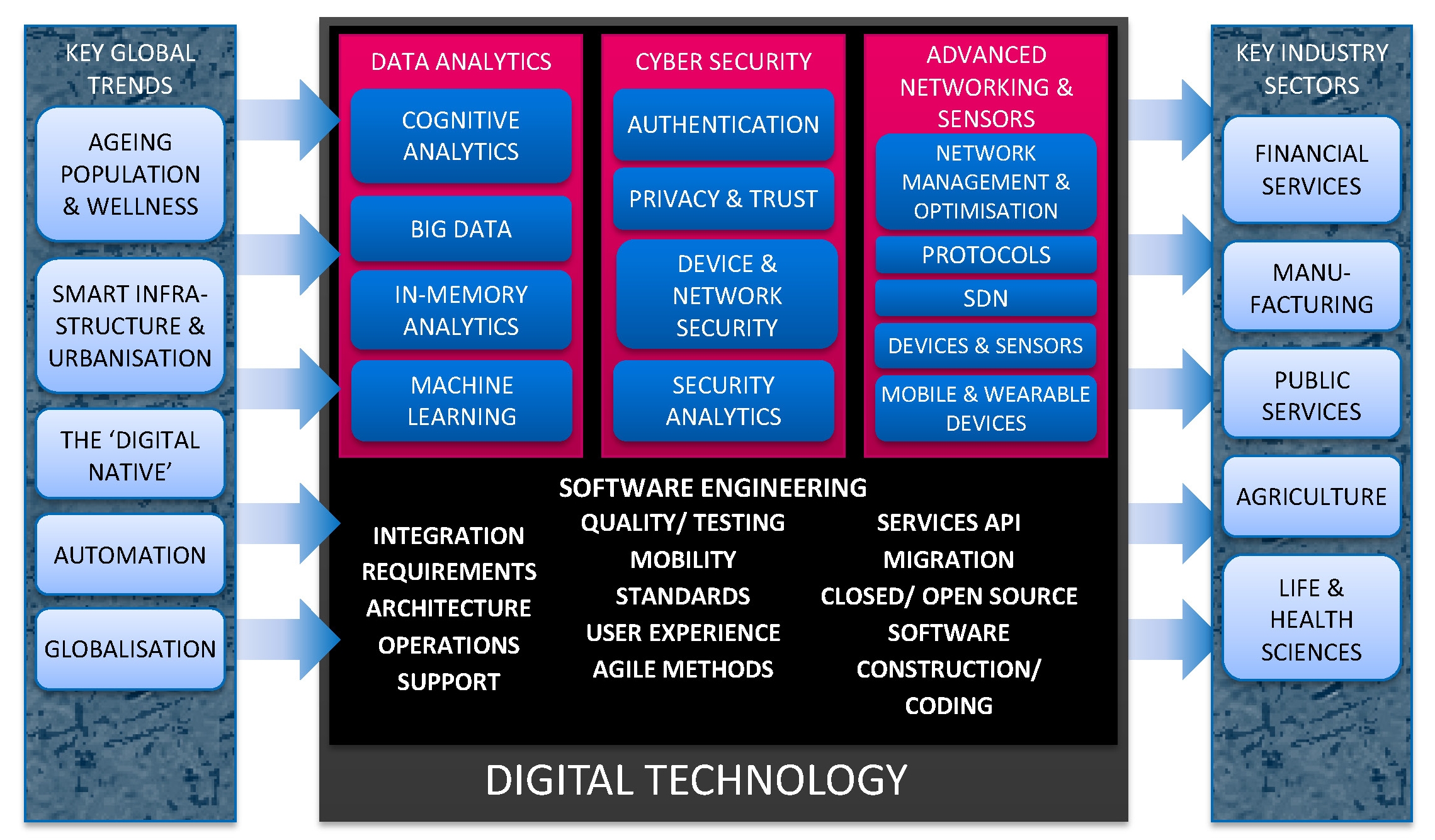The 2016 MATRIX Digital ICT Foresight Report says the whole Northern Ireland economy will benefit greatly over the coming decades from continued investment in Digital ICT.
- Download the 2016 Matrix Digital ICT Executive Summary
- Download the full 2016 Matrix Digital ICT Report
The report, which was launched on the 29th February at Stormont by DETI minister Jonathan Bell, was produced by a panel of experts selected from industry, government and academia.
Speaking at the launch, DETI Minister Jonathan Bell said, “I welcome today’s publication of the Matrix ICT/Digital Foresight report and commend the work of Chairman John Healy and his panel in its production. Such research is invaluable in helping build the knowledge-based economy which is central to Northern Ireland’s future economic competitiveness.
“My Department is committed to working with key stakeholders to ensure that the report’s recommendations are used by government and other to identify wider global science and technology innovations in the sector. In turn, this will present genuine opportunities on which Northern Ireland businesses can capitalise.”
The report identifies four areas – software engineering, advanced networks and sensors, data analytics and cyber security – where Northern Ireland has potentially world class strength. It then matches those strengths to particularly fast growing global markets and argues that if we have the skills and strategy correctly aligned, we can take full advantage of opportunities in areas like data analytics, machine learning, the Internet of Things and cyber security.

The report highlights that Northern Ireland urgently needs a skills investment plan to identify growth areas and make sure that the right digital skills for the future are being taught.
It also recommends the appointment of a Chief Digital Officer to develop and deliver a coordinated Digital Strategy and to act as a champion for the region both internally and externally.
In addition, it recommends that a new centre of data analytics is established, using the smart specialisation model so successfully delivered by CSIT, the Centre for Secure Information Technologies.
It also calls on government to become an expert and strategic customer when it comes to digital technology, and asks for the continued support of the cyber security sector.
Speaking at the launch, Digital ICT Panel Chairman and CEO of Allstate, John Healy, said, “Northern Ireland has a real opportunity to build on its present capability and success in software engineering, data analytics, networks and sensors and cyber security. We also have the potential to repeat that success in other areas.
“This report’s recommendations – the need for a skills action plan and a digital strategy for Northern Ireland, the engagement of a Chief Digital Officer, the creation of a centre for data analytics while continuing to support cyber security and the need for government to become an expert and strategic ICT consumer – are soundly rooted in evidence gathered from a wide range of business, academic and government sources.
“We hope that these recommendations will form a blueprint for the further development and growth of the sector. If they are implemented fully, there is real potential to build a globally competitive economy focused on our niche strengths.
“The panel fully appreciates the inherent difficulties of fore-sighting. However, it has set out in this report what it believes to be the most promising opportunities and how best exploit them.”
There is a long tradition of software engineering expertise in Northern Ireland stretching over 40 years and forming the bedrock of the industry. In recent years, specific strengths have emerged in advanced networks and sensors, data analytics and cyber security. These strengths have been picked up by foreign investors and Belfast is now Europe’s leading destination city for new software development projects.
There are now over 1,200 Digital ICT companies in Northern Ireland, with the number of businesses increasing by 31% over the last six years. They employ 2% of the total workforce and generate about £870m a year for the economy. Exports are up 25% over the last four years and the GVA – the contribution to the economy – for each IT worker in Northern Ireland is 58% above the Northern Ireland average.
The rates of pay are highly attractive too, with ICT specialists earning 44% above the average wage – the highest “pay premium” for ICT specialists in any UK region. With Northern Ireland students regularly achieving excellent results in STEM subjects at A level, as well as benefitting from first class third level teaching and work experience, the Digital ICT sector here has real potential for growth – so long as the barriers to success are removed.

Speaking at the launch, MATRIX Chairman Bryan Keating said, “The Northern Ireland economy, and indeed our society as a whole, will reap benefits over the coming decades by continuing to invest heavily in Digital ICT. The panel members believe that given focused investment in people, skills and research we can double the size of the Digital ICT industry here over the next 10 years as well as making vital contributions to the growth of many of our other sectors .
“Northern Ireland urgently needs a skills investment plan to identify growth areas and make sure that we are teaching the right digital skills for the future. Talented people who are skilled, motivated and passionate about what they do are the very life blood of a thriving and successful Digital ICT economy and society.
“Smart specialisation is also essential. Given the rapid advances in this sector and the speed at which market opportunities arise, it is pretty much impossible for any society wanting to compete on the global stage to be ‘generalist’ – they must specialize.”
“We build products and deliver services here that are world class and the volume of FDI companies who not only come here but also expand their operations year on year demonstrates the quality of our workforce.”
Digital ICT Panel Vice-Chair and Kainos CTO Tom Gray added, “Northern Ireland – already a leader in Software Engineering and Cyber Security – has the potential to become an exemplar region for the widespread development and use of digital technology for citizens, at home and abroad. The MATRIX Panel has made a number of important recommendations to help realise this potential, and I urge the Northern Ireland Executive to implement these recommendations promptly and effectively.”

